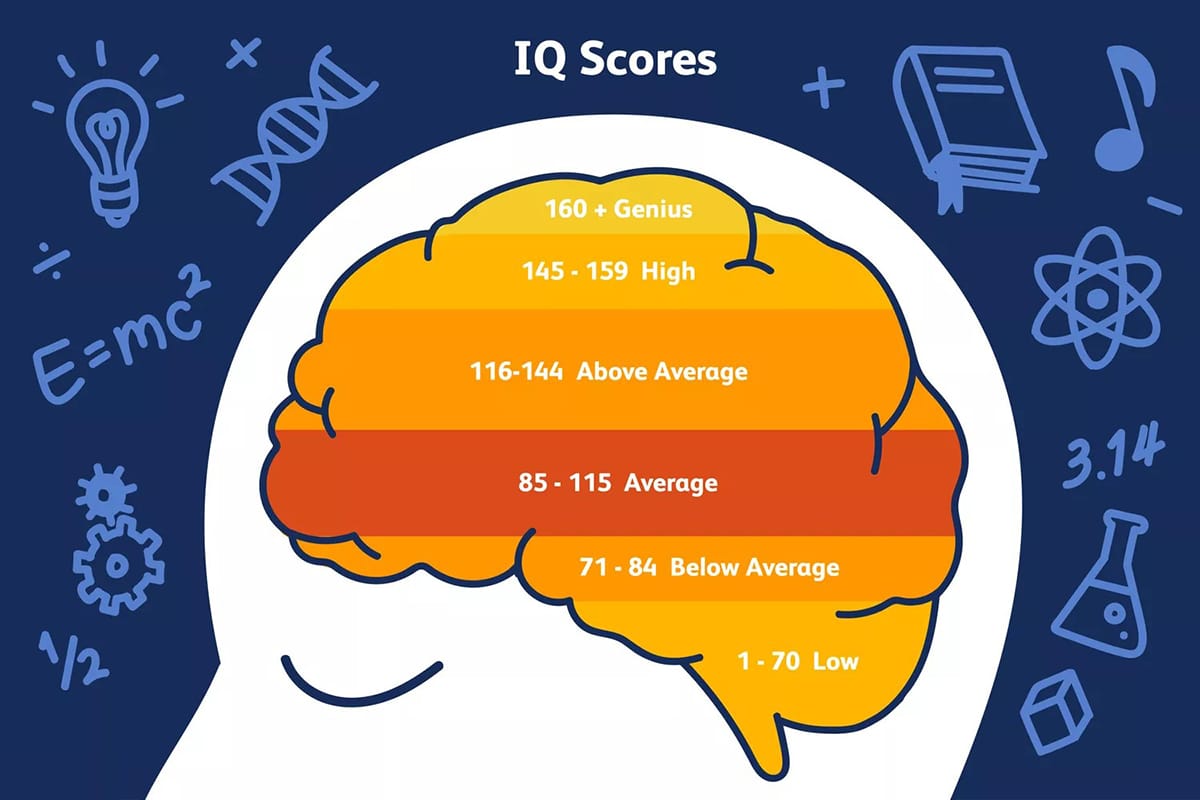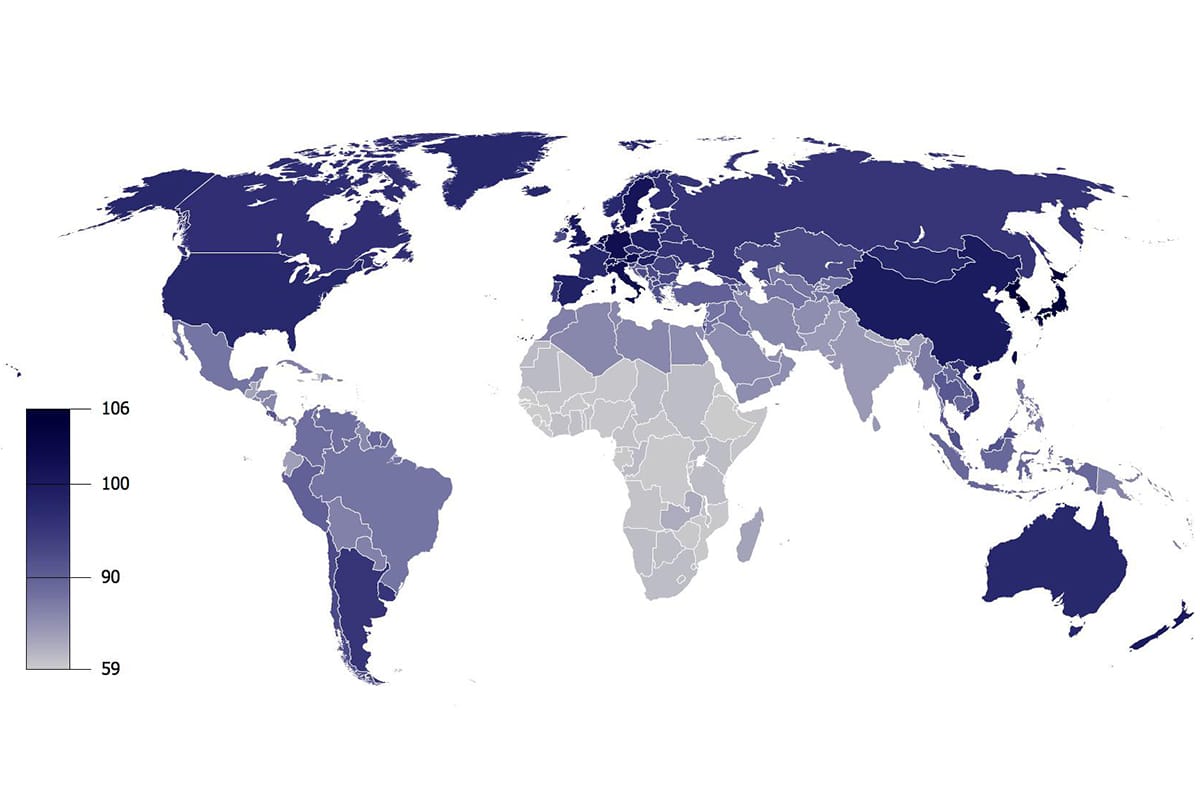
Published:
Readtime: 7 min
Every product is carefully selected by our editors and experts. If you buy from a link, we may earn a commission. Learn more. For more information on how we test products, click here.
What is the average IQ and its significance? Many wonder about the average IQ and its relevance to individual intelligence. The Wechsler Adult Intelligence Scale and the Stanford-Binet test indicate an average IQ of 100, with scores between 90 and 109 deemed as typical. However, the use of IQ as a definitive measure of intelligence is debated, and numerous other intelligence tests have emerged over time. Delve deeper into this intricate topic to understand its intricacies and nuances.

What is Your IQ?
IQ in its most simple form translates to ‘intelligence quotient’. Figuring out an individual’s ‘intelligence’ requires reaching a score that is derived from a series of standardised tests. These tests include things like problem-solving and have been designed to measure human intelligence as well as intellectual potential. Essentially, it is a reflection of an individual’s performance in a test as compared to other people in their age group.
IQ tests have become useful in school settings to help place students in certain programmes or certain schools. They are also useful in helping to identify students facing mental difficulties. On rare occasions, a job application may request your IQ. These methods all stem from being able to compare an individual’s score with the average IQ, to see how they measure up.

How is IQ Measured?
IQ is measured in two main ways. Firstly, you will need to partake in a test to receive a score. This test exists in more than a dozen different forms. Some of the most widely used tests include the Wechsler Intelligence Scale for Children, the Wechsler Intelligence Scale for Adults and the Stanford-Binet Intelligence Scale.
Once the results have been gathered, one can calculate an IQ using one of the following methods. The first method is calculated by dividing a person’s mental age, or IQ score, by their chronological age and then multiplying by 100.
The second method involves a process of comparison whereby an individual’s IQ score is compared against the scores of other people in the same age group. This method is achieved through the process of standardisation. Standardisation is achieved by analysing the results of the test which is taken by a representative sample. By taking the scores of participants in this sample, psyshometricians can use the scores to establish standards, which all individual scores can be compared to.
An interesting point to make in light of how this score is measured is the fact that the average IQ seems to be rising. Since the early 1900s, raw IQ scores have been on the rise. This phenomenon has become known as the ‘Flynn effect’. Scientist James Flynn noticed this trend and undertook research which discovered that IQ scores had been rising by three points or more per decade, all over the world.
Does this mean we have become smarter than our ancestors? Look, probably not. If we are to think logically, it is most likely due to an increase in formal education, improved nutrition, better exercise habits and an increase in vaccinations.

Why are IQ Tests Controversial?
Ever since the birth of the IQ test, they have been plagued by debate and controversy. Certain people, academics and psychologists alike have debated the correlation between IQ and the politics of class, race and sex. It is important to realise that the concept of IQ was developed by western Europeans and their cultural structures and environmental factors.
Despite various arguments suggesting IQ is affected by race and sex, there has been no hard evidence to support genetic explanations for IQ scores between different races or between men and women. What is true is the impact of environmental factors in determining someone’s score. Factors like education, health, nutrition and socioeconomic status play an important role in determining an individual’s IQ.
Another point of controversy surrounding the IQ test is the role of infectious disease. It has been found that infectious diseases may be the only important predictor of average IQ. The reason for this is simple. Researchers have found that if a child falls ill, they will use their energy to fight off the infection or illness. This energy is therefore taken away from the energy that would instead be used for brain development. There are a few studies that support this, including a study done in the US which found a clear connection between states with a higher number of infectious disease and lower score on the test.
Perhaps the most tangible controversy surrounding the concept of IQ is what it actually means for the individual and the larger society in which they function. There is no correlation between one’s IQ and success in life. Whilst IQ may be an important indicator for streamlined processes, it is hard to determine a human beings overall intelligence through a test or a rating as it doesn’t take into account common sense or more holistic understandings of intelligence. Human beings are far more complex than this and this test and the score you receive is definitely not the only way to measure intelligence.
So, don’t fret if you’re not hitting the top score as most of us aren’t either. There are many other parts to your being and your overall success and happiness.

Average IQ by Country
The average IQ is 100, and scores that fall between 90 and 109 are considered average IQ scores, according to The Wechsler Adult Intelligence Scale and the Stanford-Binet test. On these same tests, scores that fall between 110 and 119 are considered high scores. Scores between 80 and 89 are classified as low average.
According to the research of Lynn and Meisenberg, as accumulated by Healthline, the average IQ by country is as follows. It is important to note that the sample size per country may be limited, reducing the precise nature of the results. The top 10 countries by average 1Q are:
- Hong Kong (108)
- Singapore (108)
- South Korea (106)
- China (105)
- Japan (105)
- Taiwan (105)
- Iceland (101)
- Macau (101)
- Switzerland (101)
- Austria (as well as Liechtenstein, Luxembourg, Netherlands, Norway, UK) (100)
According to the same study, these are the bottom 10 countries:
- Kenya (as well as Namibia, South Africa, Tanzania) (72)
- Zimbabwe (72)
- Botswana (71)
- Ghana (71)
- Zambia (71)
- Nigeria (69)
- Swaziland (68)
- Lesotho (67)
- Mozambique (64)
- Malawi (60)

Other Intelligence Tests
In light of the various short fallings of the IQ test, there are lots of other intelligence tests that people use today. With similar intentions to the IQ test, other methods have been developed, some of which attempt to overcome the lack of consideration of environmental factors in the average IQ test.
The most popular intelligence tests include the Stanford-Binet Intelligence Scale, The Wechsler Intelligence Scale for Children, The Differential Ability Scales, The Wechsler Intelligence Scale for Adults and the Peabody Individual Achievement Test.
Some of these tests are more accurate as they are more niche to a certain group of people or age group. There are also various commercial intelligence tests carried out by companies that help the company determine the person’s intelligence concerning the specific field of expertise. These tests are particularly helpful in workplace settings.
You’ll also like:
How to Look Good in Photos
General FAQs
The average IQ is 100.
An average IQ is a score that falls between 90 and 109, so a good IQ is anything above that.
The IQ test will provide an indicative score that can help determine someone’s intelligence, but there’s no exact way of measuring how intelligence someone is.





























Comments
We love hearing from you. or to leave a comment.